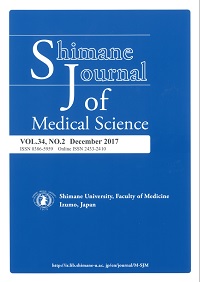Shimane University Faculty of Medicine
ISSN :0386-5959(in print)
ISSN :2433-2410(online)


These article are licensed under a Creative Commons Attribution-NonCommercial-NoDerivatives 4.0 International License.
number of downloads : ?
Use this link to cite this item : https://ir.lib.shimane-u.ac.jp/48823
Shimane Journal of Medical Science 36 2-3
2019-12 発行
Dipeptidyl Peptidase-4: Potential Pathogenic Roles in Diabetic Complications and More
Description
Both the disruption of endothelial homeostasis and tissue fibrosis are characteristics of diabetic complications. Accumulating evidence has revealed the significant role of vascular endothelial cells in tissue fibrogenesis via endothelial-mesenchymal transition (EndMT).
We have recently focused on the overexpression of endothelial dipeptidyl peptidase (DPP)-4, a critical pathological feature of the molecular mechanisms of EndMT, and suggest that DPP-4 inhibitors have great therapeutic potential via their antifibrotic effects. However, the diverse pleiotropic effects of DPP-4, both its enzyme-dependent and enzyme-independent effects, can be detrimental in some cases. This review provides an update on the biology of DPP-4, a profibrotic molecule, in addition to a discussion of cancer biology.
We have recently focused on the overexpression of endothelial dipeptidyl peptidase (DPP)-4, a critical pathological feature of the molecular mechanisms of EndMT, and suggest that DPP-4 inhibitors have great therapeutic potential via their antifibrotic effects. However, the diverse pleiotropic effects of DPP-4, both its enzyme-dependent and enzyme-independent effects, can be detrimental in some cases. This review provides an update on the biology of DPP-4, a profibrotic molecule, in addition to a discussion of cancer biology.
About This Article
Rights
Faculty of Medicine, Shimane University
Other Article
